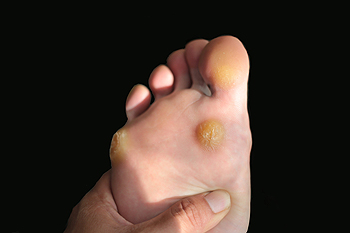 Plantar warts are small growths that appear on the heels of the feet. Pressure may make the warts grow inward beneath a thick layer of skin called a callus. Plantar warts are caused by HPV. The HPV virus is able to enter the body through tiny cuts, breaks or other weak spots on the bottom of the feet. Some signs and symptoms of plantar warts include lesions on the bottom of the foot, callused skin where a wart has grown inward and pain or tenderness when walking or standing. Children and teenagers are considered to be the most at risk to get plantar warts. Although plantar warts are not considered to be a health concern, you should still see a podiatrist in order to have the warts removed.
Plantar warts are small growths that appear on the heels of the feet. Pressure may make the warts grow inward beneath a thick layer of skin called a callus. Plantar warts are caused by HPV. The HPV virus is able to enter the body through tiny cuts, breaks or other weak spots on the bottom of the feet. Some signs and symptoms of plantar warts include lesions on the bottom of the foot, callused skin where a wart has grown inward and pain or tenderness when walking or standing. Children and teenagers are considered to be the most at risk to get plantar warts. Although plantar warts are not considered to be a health concern, you should still see a podiatrist in order to have the warts removed.
Plantar warts can be very uncomfortable. If you need your feet checked, contact one of our podiatrists from San Antonio New Step. Our doctors will assist you with all of your foot and ankle needs.
About Plantar Warts
Plantar warts are the result of HPV, or human papillomavirus, getting into open wounds on the feet. They are mostly found on the heels or balls of the feet.
While plantar warts are generally harmless, those experiencing excessive pain or those suffering from diabetes or a compromised immune system require immediate medical care. Plantar warts are easily diagnosed, usually through scraping off a bit of rough skin or by getting a biopsy.
Symptoms
Treatment
To help prevent developing plantar warts, avoid walking barefoot over abrasive surfaces that can cause cuts or wounds for HPV to get into. Avoiding direct contact with other warts, as well as not picking or rubbing existing warts, can help prevent the further spread of plantar warts. However, if you think you have developed plantar warts, speak to your podiatrist. He or she can diagnose the warts on your feet and recommend the appropriate treatment options.
If you have any questions please feel free to contact one of our offices located in San Antonio, TX. We offer the newest diagnostic and treatment technologies for all your foot and ankle needs.
Read more about Plantar Warts